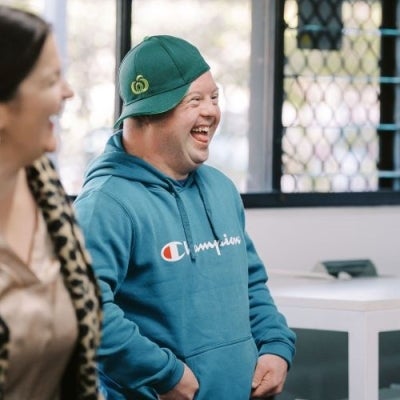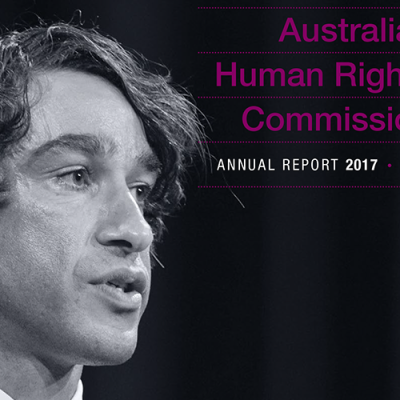Refine results
-
Disability Rights7 May 2024Webpage

Lessons from IncludeAbility
Watch the webinar with the Centre for Social Impact Swinburne on the background, lessons and evaluation findings from IncludeAbility as well as next steps... -
14 December 2012Book page
Social Justice Report 2001: Chapter 6: Reconciliation – National progress one year on
In its final recommendations, the Council for Aboriginal Reconciliation proposed that there be a legislative requirement for the Social Justice Commissioner to monitor progress towards reconciliation on an annual basis. In the Social Justice Report 2000 it was noted that while legislative amendment to this end was desirable, this task could be undertaken under my existing functions. Accordingly,… -
14 December 2012Book page
Unlocking Doors: Audit of Initiatives Related to Police and Muslim Communities
Audit of Initiatives Related to Police and Muslim Communities AGENCY PROJECT DURATION COMMONWEALTH COMMONWEALTH SECRETARIAT Commonwealth Manual for Human Rights Training of Police This manual is designed to help Commonwealth Governments promote an understanding of and respect for human rights. The manual provides strategies and training programs to equip and enable police services to… -
14 December 2012Book page
Annual Report 2001-2002: Statement from the President
The Commission’s vision is of and for an Australian society in which the human rights of all people are respected and promoted. Our task is to find practical, pragmatic ways to turn the rhetoric of human rights into an everyday reality for all Australians and build a more tolerant and inclusive community. As this report indicates, this past year has been a period of substantial achievement… -
Legal14 December 2012Webpage
Access and Equity: Inquiry into the responsiveness of Australian Government services to Australia’s culturally and linguistically diverse population
The Australian Human Rights Commission makes this submission to the Access and Equity Inquiry Panel in its inquiry into the responsiveness of Australian Government services to Australia’s culturally and linguistically diverse population. -
14 December 2012Book page
Social Justice Report 2005: Chapter 3
The first twelve months of the federal government's new arrangements for the administration of Indigenous affairs has ended. The primary focus of this period has been on abolishing the Aboriginal and Torres Strait Islander Commission (ATSIC) and creating new processes to engage with local Indigenous communities and coordinate mainstream delivery of services to Aboriginal and Torres Strait… -
14 December 2012Book page
Native Title Report 2004 : Chapter 1 : The Consultations
During the 2004 reporting period I have embarked on a series of consultations focusing on the ideas and principles that were contained in a Discussion Paper, released by my predecessor as Social Justice Commissioner in June 2003. The Discussion Paper was entitled Promoting Economic and Social Development through Native Title (at Annexure 1). This chapter seeks to record and develop the ideas and… -
14 December 2012Book page
Native Title Report 2006: Chapter 7: The Yarrabah Housing Project
Underpinning the Government’s partnerships approach to Indigenous policy is the belief that economic development is the key to sustainable improvement in the quality of life of residents of Indigenous communities.1 -
14 December 2012Book page
Social Justice Report 2006: Appendix 4: Second International Decade of the World’s Indigenous People
This Appendix reproduces materials approved by the United Nations General Assembly when establishing the Second International Decade of the World’s Indigenous People. It also extracts and briefly comments on the main provisions of the Program of Action for the Second Decade. -
14 December 2012Book page
Chapter 4: Beyond the Apology - an agenda for healing: Social Justice Report 2008
On 13 February 2008 Prime Minister Kevin Rudd, on behalf of the Australian Parliament, made a historic and long overdue national Apology to the Stolen Generations. With eloquence and emotion, Prime Minister Rudd said what so many Australians have wanted to say, and what so many Indigenous peoples have needed to hear: -
14 December 2012Book page
Chapter 4: Cultural safety and security: Tools to address lateral violence - Social Justice Report 2011
Lateral violence is a multilayered, complex problem and because of this our strategies also need to be pitched at different levels. In Chapter 3 I have looked at the big picture, with the human rights framework as our overarching response to lateral violence. In this Chapter I will be taking our strategies to an even more practical level, looking at how we can create environments of cultural… -
14 December 2012Book page
Native Title Report 2007: Chapter 12
Securing sustainable and just economic outcomes for Aboriginal traditional owners and residential communities in the remote regions of the Northern Territory has been an elusive goal for national and Territory governments, various public agencies and community groups for many years. The increasing value and intact environmental nature of much of the Indigenous estate across the North of Australia… -
Commission – General17 January 2019Publication

Annual Report 2017-2018
This Annual Report sets out the performance of the Australian Human Rights Commission in the 2017–18 financial year. -
Aboriginal and Torres Strait Islander Social Justice29 May 2019Opinion piece
Indigenous Australians can be bystanders no longer
Two years ago, we gathered in the red dust for a ceremony at Uluru and offered a gift to all Australians. There was a great sense of hope about what this gift could deliver. A new beginning, an opportunity to re-define who we are as a country. A country that celebrates its First Peoples and resets the relationship between all Australians for a better future. Despite the recent setbacks and… -
13 November 2014Book page
The Year in Review
Building understanding and respect for human rights and fundamental freedoms We all have a responsibility to respect the rights and freedoms of others. To make this a reality, the Commission works to build greater understanding of human rights and their importance in daily life. This is one of our two key priorities for 2011-2014. We work with a broad range of groups across the country,… -
Legal14 December 2012Webpage
Native title payments discussion paper – Optimising Benefits from Native Title Agreements
The Aboriginal and Torres Strait Islander Social Justice Commissioner has produced 15 Native Title Reports which include analyses and recommendations on the operation of the native title system and its effect on the exercise and enjoyment of Aboriginal and Torres Strait Islander peoples.[1] Particularly relevant is the Native Title Report 2003, which provides a detailed comparative analysis of… -
14 December 2012Book page
Discussion Paper: African Australians: A report on human rights and social inclusion issues (2009)
The Australia of 2009 is a proud multicultural nation. It is a nation, culturally, socially and economically formed by the unique combination of its First Nation peoples, its early settlers, and by the many waves of subsequent migration. As such, negotiating diversity and respecting people of all faiths, races, cultures and identities has evolved into an important characteristic of being a member… -
14 December 2012Book page
Social Justice Report 2000: Chapter 5: Reparations
The Senate Legal and Constitutional References Committee conducted an inquiry this year into the federal government's implementation of recommendations made by the Human Rights and Equal Opportunity Commission in Bringing them home. The inquiry considered proposals for the establishment of an alternative dispute resolution tribunal for members of the stolen generations; and considered the… -
14 December 2012Book page
Social Justice Report 2001: Chapter 3: Indigenous governance and community capacity-building
Last year’s Social Justice Report noted that to date there has been insufficient attention by governments to processes which ensure greater Indigenous participation and control over service design and delivery as part of an overall strategy to redress Indigenous disadvantage and economic marginalisation. I observed that: -
Commission – General14 December 2012Speech
President speech: The role of culture and human rights in promoting human development
[1] According to the 2003 Convention for the Safeguarding of the Intangible Cultural Heritage, the intangible cultural heritage (ICH) – or living heritage – is the mainspring of our cultural diversity and its maintenance a guarantee for continuing creativity. It is defined as follows: Intangible Cultural Heritage means the practices, representations, expressions, knowledge, skills – as well as…
